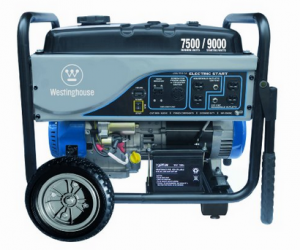Let’s face it. We are spoiled. We enjoy our creature comforts and we’ve come to expect them. From ambient lighting, ever-present refrigerator and freezer to air conditioning and the convenience of cable TV, wall-to-wall wi-fi and, oh yes, let’s not forget the electric toothbrush and hairdryer – we assume they’ll be there when we turn to them.
But when the lights go out . . .
and the power company says it will be 5-7 days before power can be restored, what now?
In our CERT community, the logical answer seemed to be to go out and buy a generator. A 6-8,000 Watt model would power a whole house; it seemed like a reasonable action to take. We voted on it at our monthly CERT-Leadership Team meeting and decided to purchase one generator as a pilot project. If, after testing over a 90-day period, the generator performed as well as we anticipated, we would put forth a plan to acquire additional units to be rotated among the more critical homes in the community.
Sounds like a rational plan, right?

Large enought to power a whole house
The generator we purchased came in a large box. There were images showing wheels and handles, but the thing required assembly.
I thought two of us could handle it. I was wrong. We managed with the help of a third person . . . barely!
When we got the wheels on we were at least able to move it, but still, only slowly. Much to our disappointment it was becoming apparent that our original plan was lacking. Actually it was turning out to be downright unrealistic.
To compound the challenge . . .
As it turns out, these generators cannot sit idle for long periods. Once fired up, they must be run at least every 30-45 days. To store or sit idle longer than 30 days, it is recommended that you follow specific storage procedures to prevent damage to the machine.
The warnings also make it clear that the 8kW generator can be dangerous to run if you don’t follow safety instructions. It can, for example kill you in a matter of minutes if you run it inside! Or it can start a fire if you turn it on with appliances improperly connected.
And, since most modern homes include a wide array of appliances, it’s really questionable that even an 8kW generator will be able to power an entire home.
Here, for example, are some typical running wattage requirements for a number of common appliances:
| Appliance | Req’d. Watts | Appliance | Req’d. Watts |
| Ceiling Fans | 750+ | Radio/Stereo system | 75 – 450 |
| Computer & Monitor | 275 | Television (color), 27 inch | 115 |
| Computer, Laptop | 60-75 | Television (color), 36 inch | 140 |
| Dishwasher | 1,200 – 2,400 | Television (color), Flat Screen | 125 |
| Furnace | 750 | Toaster | 750 – 1,500 |
| Hair Dryer | 1,200 – 1,850 | Toaster Oven | 1,250 |
| Heater (Portable) | 750 – 1,500 | VCR/DVD | 17-20/20-25 |
| Microwave | 750 – 1,000 | Vacuum Cleaner | 1,000 – 1,500 |
| Refrigerator (18 cu. ft.) | 750 | Water Heater (Electric) | 4,500 – 5,500 |
So maybe a smaller generator makes more sense.
If you look at this list of appliances a number of things become clear:
- A smaller generator/inverter can handle most critical tasks, just not all at once.
- If you run a high-output generator just to power a refrigerator/freezer for half an hour a couple of times a day, you’re wasting precious energy and using up fuel . . . fuel that’s expensive as well as difficult and even dangerous to store.
- Smaller, lightweight units are far more portable and economical to run.
What about price?
Now, many will argue that the initial purchase price isn’t all that different. While you will likely pay $400 – $600 for a quality unit putting out 2,000 – 3,000 watts and $600 – $800 for a unit that produces 6,000 – 8,000 Watts of power, it seems like the larger output machine is a better bargain.
Whatever “savings” you might enjoy, however, will quickly disappear and be overshadowed by the large quantity of fuel you are required to store, and the rate it is consumed by the larger unit. Those, compounded by the maintenance requirements and lack of real portability, make the smaller units far more flexible and economical to operate.
In our estimation, this is an excellent example of where less is more.
Interested in more on Generators?
Let us know YOUR experiences.
Joe Krueger
Your Emergency Plan Guide team
Don't miss a single Advisory.
Thank you for subscribing.
Something went wrong.
